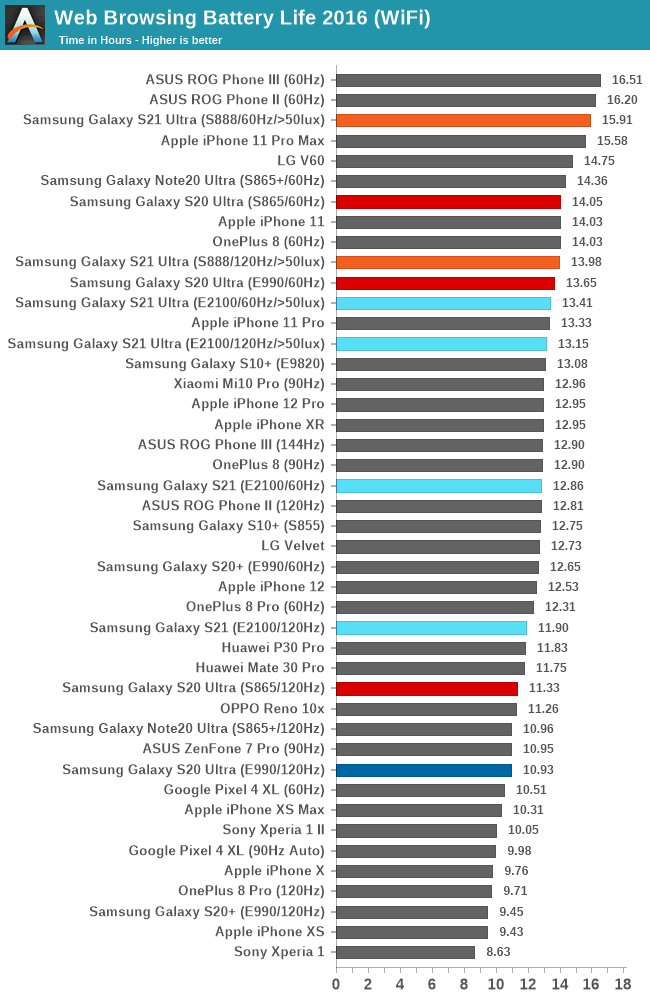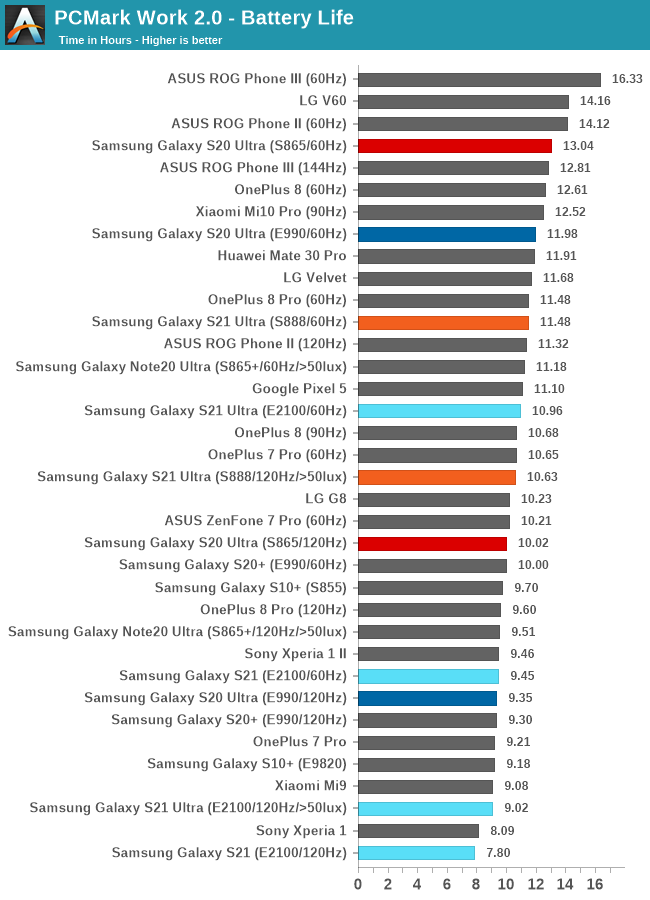The Samsung Galaxy S21 Ultra & S21 Review: The Near Perfect and The Different
by Andrei Frumusanu on February 22, 2021 12:00 PM EST- Posted in
- Smartphones
- Samsung
- Mobile
- Galaxy S21
- Galaxy S21 Ultra
Battery Life - Actually Great
Battery life of the S21 series is interesting as there’s two opposing factors that come into play. We’ve seen that this generation of SoCs are actually less energy efficient than last year’s iterations during interactive workloads. This comes at the benefit of higher performance, but generally it’s accurate that the new chips use more power. On the other hand, we also have more efficient displays, and high-refresh-rate operating modes.
On the Galaxy S21 Ultra, both software and hardware adaptive frequency work on a frame basis, allowing it the maximum power efficiency benefits even during 120Hz operation. Together with the much more luminance efficient screen, we should be looking at outstanding battery efficiency.
The regular S21 is more interesting as we hadn’t had the opportunity to see Samsung’s adaptive refresh mode on a display which doesn’t support hardware LFD. Here, the mode switching between 120Hz and 60Hz is on a coarser software level – the display will switch to 60Hz on static screens, but only after around a second of inactivity. That’s actually still great for power efficiency compared to the constant 120Hz of the S20 series, which means that in general every-day scroll-and-read behaviour, the 120Hz mode of the S21 and S21+ should still be much more efficient than their predecessors.

In our web-browsing test, the results here are slightly different to our provisional test results we had published a few weeks ago- notably on the 120Hz runs.
Nevertheless, the results for the S21 Ultra are outstanding. Even though in theory the SoC is more power hungry, the new display is so much more efficient, that we’re seeing the S21 Ultra takes a large lead of 13% at 60Hz for the Snapdragon variant. The generational differences for the Exynos variants here is much smaller due to how more much responsive and aggressive the new SoC is, which mostly counteracts the new luminosity efficiency of the screen.
In 120Hz mode, the new Ultra devices both take massive leaps over their predecessors- showcasing the new adaptive frequency and LFD mechanisms and how they make 120Hz viable in every-day usage.
Even the smaller S21, the software based adaptive refresh helps a lot as the shift from 60Hz to 120Hz now only costs around 8% in battery life, whereas last year on the S20+ it had a +25% impact.
People will notice the Snapdragon S21 Ultra has a larger delta between its 60 and 120Hz modes, and I think that’s because for some reason the Snapdragon 888 behaves much less aggressive in its 60Hz setting, while the Exynos S21 is tuned to be equally responsive regardless of refresh rate, which is a software discrepancy between the two phones.

Overall Battery Life: Great
In general, the S21 Ultra’s battery life is just fantastic thanks to the new generation display and its heightened power efficiency. The advantages here will vary depending on how you use it – if you tend to use it in dim environments at lower brightness, you might not see the improvements as much as if you’re in a bright scenario and tend to use your phone at high brightness levels. The brighter it will be, the better the S21 Ultra will fare. In super bright scenarios, the phone will be unmatched.
For the S21, and likely applicable to the S21+ as well, battery life is also great. While not as powerful as the Ultra’s adaptive refresh mechanisms, the new software-based implementation on the S21 means that 120Hz is also a very viable option this generation.
While we’re seeing battery life this generation still favour the Snapdragon chips, the Exynos this year isn’t all that far behind, and given the general user experience equality between the two phones, it’s not a major point of contention anymore.










122 Comments
View All Comments
Silver5urfer - Wednesday, February 24, 2021 - link
Mass market just mindlessley consumes. Remember that Android had Windows like Filesystem which was the most powerful feature ever on smartphone. Google killed it in the name of Security. Esp all the images that you download on these latest Android 10+ phones, you cannot see any image or file under fileexplorer because its in the app own folder and once you uninstall all of it is wiped clean. It's ultimate kick in the gut for Android. On top no MicroSD card.But it's all great, because it looks good ? not to me anyways with that ugly screen hole and bump of camera module. It's great because it's the trend nowadays. These stupid smartphones are ruining more than anything with their social media junkware and addiction to teens all over the world and have some status quo as well.
AT should have done some great deep dive on how OS is getting sandbagged to emulate and copy Apple in HW and SW but they do not give a shit. It's all spec benchmarks, Camera. Not even damn cost, not even specifications get pointed out. Fucking $1000 phone with plastic ? What the hell ? No charger as well, they even axed MST.
But nope. It's a great device, tmrw Apple will kill Lighting port, you will see AT praise It's the future along with all Shills on youtube and other so called tech blogs.
Windows is also sadly in a state of perpetual derangement, with it's as a service model bullcrap and their anti computing, they shove all that touch based garbage UWP UI into Win32 and pollute the UX of Windows as a powerful Desktop OS to a sandbagged corporate siphon for data on userbase and ship broken trash and use them as guinea pigs to push stable software for Win10 Enterprise customers.
JoeDuarte - Thursday, February 25, 2021 - link
I think that locking down the file system is a good and obvious security move, though it shouldn't come at any cost to the user. There should be obvious folders for things like photos, and those should not be cleaned out by uninstalling an app.Google is a hopelessly bad company at this point though, and I would never trust them to design a good OS. They're not good enough, and they're just enjoying their market share because no one seems interested in launching a new OS, for mobile or more broadly.
OSes could and should be massively more secure. It's a dimwitted myth that computers have to be insecure. If I were designing an OS, the user wouldn't know anything about a "file system" and there's no way anyone would be able to see system/OS folders and files. That's a huge information security leak. Of course apps would have no awareness of the system directory tree either. In fact, I might even physically isolate the OS on its own flash storage – a little 16 GiB of NAND or Optane would be more than ample. It could have all sorts of layered security measures, in software and hardware.
I'd give users enormous control over things like their files, photos, etc. More user-friendly than Android for sure. But they don't need access to OS innards, and they don't need the "file system" abstraction – it doesn't add any value to the UX. Entire categories of Windows exploits would disappear if users didn't have access to system folders.
iphonebestgamephone - Friday, February 26, 2021 - link
So no modding on your os?JoeDuarte - Wednesday, March 3, 2021 - link
Good question. I guess I lean toward yes, it would be possible to mod. Maybe something like a Developer Mode would be the way to implement it. If the file system is locked down, and OS files are locked down, by default for non-modding users, that should be good enough to obtain the security benefits in terms of exploit resistance.Exploits would be much less important if 9X% of users were immune. Well even modded systems would be immune to the sorts of exploits that are common now, all the memory bugs, overflows, use after frees, ROP, etc. A good OS would be formally verified (like seL4) and written in a new, advanced, and inherently secure programming language (secure against memory bugs, among other things). So I think modding would be cool, and I also think any desktop and laptop should be thoroughly upgradeable on the hardware side, so removable SSDs and RAM and maybe FPGA slots. I'm fine with non-upgradeable phones, but it would be sweet if they could achieve the same or better thinness while having a removable battery. Non-removable batteries don't seem to have given the use any benefits in terms of thinness, since the phones didn't get thinner. If anything, they're slightly thicker now, which is a shame, and I think the tech media has underexposed this fact – there was no benefit. And iPhones didn't get any thinner from removing the headphone port, which was supposed to be motivated by space savings. The media didn't seem to notice that the thickness didn't change...
iphonebestgamephone - Friday, March 5, 2021 - link
Ok thenRude Russy - Tuesday, March 9, 2021 - link
Wow you are a miserable shit and you don't know what you are talking about. As for the headphones all you have to do is get a usb-c adaptor and you can plug your headphones in.tuxRoller - Wednesday, February 24, 2021 - link
Has the huawei always used such strong edge detection/enhancing?Some of the shots bring to mind me an aggressive comic inker.
s.yu - Thursday, February 25, 2021 - link
Huawei is back and forth on this issue, generally the Mates are better and the P's are worse, IIRC P20 was the worst I've ever seen, but in the scope of this review my attention was on the Samsungs' tele samples.asfletch - Wednesday, February 24, 2021 - link
Just wanted to chime in to thank you for the hard work you put into these reviews Andrei. The comments section seems to be increasingly grievance-driven and glib these days, but as a long time reader I appreciate that you’re still able to provide more technical detail than most other reviewers despite not having a huge budget (eg to purchase and spend forever testing every variant).To those moaning about video testing, Youtube is a better forum for that kind of thing anyway. You won’t find in depth screen or platform analyses on there though.
Giro - Wednesday, February 24, 2021 - link
Hello Andrei, thanks A LOT for this comprehensive review.It seems you consider Huawei like the reference for low light AND use of a better set-up for intermediate levels of zoom.
Regardless of the OS, where Huawei falls behind Samsung now ?